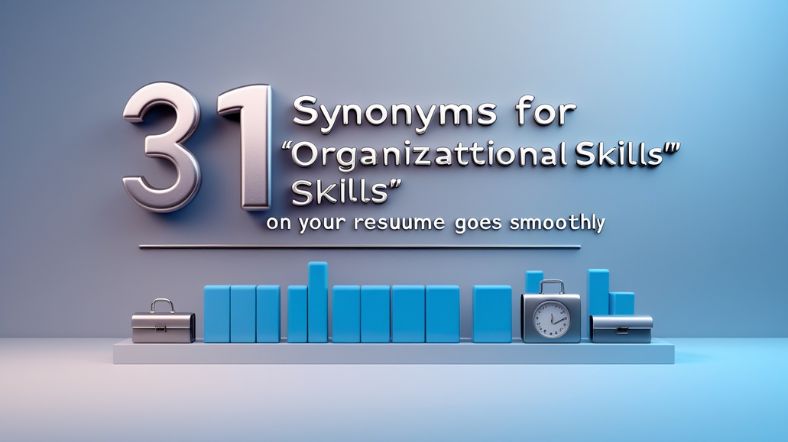When it comes to crafting a standout resume, the way you present your abilities can make a big difference. The term “organizational skills” is widely used, but there are plenty of alternatives that can help you convey the same idea with more precision or flair.
These alternatives not only showcase your capability to keep things in order, but they also highlight different aspects of your expertise, depending on the role you’re applying for.
Let’s dive into 31 synonyms for “organizational skills” and how you can use them to strengthen your resume or professional profile.
Structured Planning
This phrase emphasizes the ability to create well-organized strategies and plans. It’s a great way to highlight your knack for methodical approaches to tasks, whether in project management or daily operations.
Example: “In my previous role, I utilized structured planning to streamline the workflow and meet all project deadlines effectively.”
Impact: This phrase conveys reliability and a well-thought-out approach to tasks, which is highly valued in managerial and leadership roles.
Administrative Proficiency
Highlighting administrative proficiency signals that you possess strong organizational capabilities specifically in office tasks, systems, and general administrative work.
Example: “My administrative proficiency has helped my team maintain smooth operations, ensuring all records were managed efficiently.”
Impact: This synonym is ideal for jobs requiring attention to detail in administrative processes, such as executive assistants or office managers.
Time Management
Time management is one of the most critical aspects of being organized. It suggests that you can balance multiple tasks, meet deadlines, and stay focused.
Example: “Time management has been crucial in my ability to handle multiple projects without compromising quality.”
Impact: This phrase is a must for any role that requires juggling tasks or tight deadlines, from project managers to customer service representatives.
Project Management Skills
Project management involves organizing resources, schedules, and people to achieve a goal. If you excel at overseeing and delivering projects, this is a perfect synonym.
Example: “My project management skills helped our team successfully launch new product lines within the set timeline.”
Impact: Using this term demonstrates your ability to lead and manage a team, making it ideal for higher-level or specialized positions.
Prioritization Skills
Being able to determine what tasks need immediate attention and what can wait is key to effective organization. This phrase is especially useful in fast-paced environments.
Example: “I’ve honed my prioritization skills to effectively address urgent issues while keeping long-term objectives on track.”
Impact: This synonym reflects your ability to make critical decisions about where your attention is best placed, a skill necessary for managerial roles.
Systematic Organization
This phrase focuses on methodical, structured approaches to keeping things in order, often involving a consistent process or set of procedures.
Example: “With systematic organization, I was able to reduce redundancies and improve the efficiency of our workflows.”
Impact: Ideal for roles in operations, logistics, or any area requiring structured systems.
Task Coordination
Task coordination emphasizes your ability to oversee and align various tasks and activities in order to achieve a goal.
Example: “Task coordination played a vital role in ensuring all departments collaborated smoothly during the product launch.”
Impact: This phrase is ideal for team-based roles, showcasing your ability to bring people together and keep tasks running smoothly.
Efficiency Optimization
Efficiency optimization refers to streamlining processes to make operations faster and more effective. It indicates that you not only organize but also aim for continuous improvement.
Example: “I implemented efficiency optimization strategies, which reduced project delivery time by 20%.”
Impact: This is perfect for roles that require process improvement or operational leadership, such as in management or tech fields.
Workflow Management
This term focuses on how you organize and supervise the flow of tasks within a system or team.
Example: “My workflow management expertise ensured that all processes were completed in a timely and organized manner, boosting overall productivity.”
Impact: A great term for operations managers or any position that involves overseeing and refining processes.
Strategic Planning
Strategic planning involves envisioning long-term goals and organizing efforts to reach them. It’s a key skill for senior roles or positions that require foresight and high-level coordination.
Example: “Through strategic planning, I was able to align our team’s objectives with company goals, leading to a 15% increase in sales.”
Impact: This term carries a sense of leadership and foresight, often used for executives or roles that require a big-picture approach.
Multitasking Ability
The ability to handle multiple tasks simultaneously is a common requirement in many professional environments. This synonym shows you can juggle several responsibilities while maintaining organization.
Example: “My multitasking ability allowed me to manage client communications while overseeing internal operations effectively.”
Impact: This is especially helpful for customer-facing roles or fast-paced environments where balancing multiple priorities is key.
Resource Allocation
Resource allocation refers to how you manage people, time, and materials to maximize productivity. It’s a key component of organizational skills in project-based work.
Example: “I excel in resource allocation, ensuring that every team member is utilized to their full potential without overburdening anyone.”
Impact: Great for roles that involve managing resources, like project managers or team leads, highlighting both your leadership and organizational acumen.
Detail Orientation
Being detail-oriented means you’re meticulous in organizing and ensuring every aspect of a project or task is in order.
Example: “My detail orientation allowed me to catch discrepancies early, ensuring a high level of accuracy in all reports.”
Impact: This phrase is ideal for positions where precision and attention to detail are crucial, such as data analysis or quality control.
Process Improvement
Process improvement is all about refining systems to increase efficiency and effectiveness. It highlights your ability to optimize how things are done while staying organized.
Example: “I led several process improvement initiatives that reduced waste and saved the company significant time and resources.”
Impact: Ideal for roles in operations or management where optimizing workflow is part of the job.
Effective Delegation
Delegation is an essential skill for organizational success, especially in leadership roles. This phrase shows that you know how to entrust tasks to the right people while keeping the big picture in mind.
Example: “Effective delegation allowed me to empower my team and meet our deadlines consistently.”
Impact: A powerful phrase for leadership roles, as it shows your ability to balance responsibility and teamwork.
15 Synonyms for “Organizational Skills” on Your Resume
Organizational skills are among the most sought-after qualities in today’s fast-paced job market. Whether you are a student, an entry-level professional, or an experienced manager, being able to showcase your ability to stay organized and efficient can set you apart from other candidates. While “organizational skills” is a commonly used phrase, you may want to explore some fresh alternatives to highlight your competencies. Below, we explore 15 synonyms that can help you more effectively express your organizational capabilities on your resume, cover letter, or in an interview.
Organizational Skills Meaning
Organizational skills refer to the ability to plan, prioritize, and manage tasks effectively. These skills help individuals structure their time and resources to achieve specific goals efficiently.
Example: “My organizational skills have been a key factor in successfully leading teams and ensuring project timelines are met without any issues.”
Impact: Emphasizing organizational skills helps show your competence in multitasking and managing competing demands.
Organizational Skills Examples
When using the term “organizational skills,” providing examples can solidify your claim. For instance, managing a project timeline, coordinating team meetings, or scheduling appointments all demonstrate organizational strength.
Example: “I’ve demonstrated organizational skills by managing multiple projects simultaneously, ensuring all deadlines were met and client expectations exceeded.”
Impact: Specific examples provide credibility, offering tangible proof of your organizational abilities.
Organizational Skills in CV
Including organizational skills in your CV is essential because they are a fundamental trait sought by employers. Highlighting these skills can help your CV stand out in competitive job markets.
Example: “Organizational skills listed in my CV have led to improved workflow efficiencies, ensuring every team member was aligned on the project’s goals and deadlines.”
Impact: Tailoring your CV to emphasize these skills shows potential employers that you are organized and results-oriented.
Synonym for Organizational Skills
A synonym for organizational skills includes any term that communicates your ability to manage tasks and streamline processes. Some great alternatives include “time management,” “task management,” or even “efficiency.”
Example: “My time management skills have enabled me to juggle multiple projects without compromising quality.”
Impact: This synonym emphasizes how well you allocate your time, making you appear reliable and efficient—qualities highly sought after by employers.
Another Way to Say Organizational Skills
Another way to describe organizational skills is by highlighting your ability to coordinate or structure tasks and workflows. Terms like “workflow optimization” or “task coordination” convey a similar concept but with a different focus.
Example: “I excel in task coordination, ensuring each team member is aligned with the project goals and deadlines.”
Impact: This phrase highlights your leadership and coordination abilities, showing that you can not only organize tasks but also guide others in completing them effectively.
Organized Synonym Resume
On your resume, the word “organized” can be used as a direct synonym for organizational skills. However, there are various ways to convey this concept, such as “systematic,” “methodical,” or “structured.” These words suggest a strong attention to detail and a dependable approach to work.
Example: “I bring a methodical approach to managing projects, ensuring that every task is completed on time and to the highest standard.”
Impact: Using this synonym conveys a strong sense of order and reliability, both of which are crucial in professional settings that demand precision and consistency.
Another Word for Organizational Skills
Another word for organizational skills that may resonate with certain job roles is “planning” or “strategic planning.” These terms focus on your ability to map out processes and structure your actions with the bigger picture in mind.
Example: “My strategic planning experience has helped me streamline company procedures, resulting in a 20% improvement in team productivity.”
Impact: This synonym emphasizes foresight and big-picture thinking, qualities highly prized in leadership roles or in positions where long-term planning is crucial.
Organizational Skills Synonym
Finding synonyms for “organizational skills” can allow you to use varied language to describe your capabilities. For instance, “time management,” “task coordination,” and “project management” are often used interchangeably.
Example: “My time management skills allow me to balance multiple priorities, ensuring every task is completed efficiently.”
Impact: Using synonyms helps avoid repetition and enhances the readability of your resume or interview responses.
Organizational Skills Examples for Students
For students, organizational skills might mean balancing schoolwork, extracurricular activities, and part-time jobs. Demonstrating how you manage various responsibilities can set you apart as a well-organized individual.
Example: “I successfully balanced my studies, volunteer work, and part-time job, always ensuring that each was given the attention it deserved.”
Impact: Students can use organizational skills to demonstrate their ability to manage time and prioritize tasks, which is valuable in the workplace.
Organizational Skills Interview Questions
In interviews, employers often ask about your organizational abilities to assess your approach to work and problem-solving. Be prepared to share examples of how you stay organized, whether through time management, prioritization, or task delegation.
Example: “In a fast-paced environment, I rely on task management tools to keep everything organized and ensure no deadlines are missed.”
Impact: When answering questions about organizational skills, your response shows that you can handle responsibilities and adapt to challenging situations.
Organizational Skills Experience
Organizational experience refers to past instances where you demonstrated the ability to manage or organize tasks. Highlighting relevant organizational experience can provide evidence of your competence in this area.
Example: “My experience in organizing large-scale events has sharpened my ability to coordinate resources, schedules, and teams effectively.”
Impact: Showcasing your experience helps employers see how you’ve applied organizational skills in real-world situations.
Organizational Skills or Organization Skills
Both terms refer to the same concept, though “organizational skills” is more commonly used in professional settings. The slight difference in wording doesn’t change the core meaning, but “organizational skills” is considered more formal.
Example: “I have honed my organizational skills over the years, leading to improved team performance and more efficient project completion.”
Impact: Both phrases convey the same competence, so it’s important to maintain consistency in whichever version you choose.
Organizational Skills Jobs
Jobs that require strong organizational skills include positions in project management, administration, and event planning. Listing these types of jobs shows you’re capable of thriving in environments that demand excellent organizational abilities.
Example: “I’ve worked in jobs that required me to organize schedules, plan events, and coordinate logistics to ensure smooth operations.”
Impact: Demonstrating organizational skills in job contexts shows that you can handle varied and dynamic responsibilities.
Organizational Skills at Work
At work, organizational skills go beyond personal task management—they also involve managing teams, organizing meetings, and ensuring that resources are allocated appropriately.
Example: “My organizational skills at work have allowed me to streamline internal processes and ensure the team is aligned with our goals.”
Impact: Highlighting organizational skills at work emphasizes leadership and the ability to manage both yourself and others effectively.
Organizational Skills Resume
Your resume is the perfect platform to showcase your organizational skills. Whether it’s through managing multiple projects, handling client communications, or maintaining schedules, your resume should reflect your ability to stay organized.
Example: “In my resume, I’ve emphasized how I organized team schedules and handled logistics for multiple client projects, ensuring timely delivery.”
Impact: A resume that highlights organizational skills communicates to employers that you are dependable and capable of managing responsibilities efficiently.
Organizational Skills in Management
In management roles, organizational skills are key to leading teams, overseeing operations, and ensuring business objectives are met. Effective managers rely on these skills to delegate tasks and streamline processes.
Example: “My organizational skills in management allowed me to streamline our project pipeline, increasing team productivity by 30%.”
Impact: For management positions, demonstrating organizational expertise shows that you can handle high-level responsibilities and guide a team toward success.
Importance of Organizational Skills
Organizational skills are critical because they enable individuals to prioritize tasks, meet deadlines, and handle multiple projects at once. These skills improve efficiency, reduce stress, and enhance overall productivity.
Example: “The importance of organizational skills in my career has been evident in how I have managed complex projects and achieved successful outcomes.”
Impact: Recognizing the importance of organizational skills underscores their value and demonstrates to employers that you understand their role in success.
Organizational Skills Examples for Interview
In interviews, giving concrete examples of how you’ve applied your organizational skills can leave a lasting impression. Whether it’s through managing a team, scheduling meetings, or prioritizing tasks, sharing real-life examples is powerful.
Example: “When I was asked to manage the onboarding process for new employees, I used my organizational skills to ensure all materials were prepared in advance and that the schedule ran smoothly.”
Impact: Providing examples during interviews allows you to showcase your organizational skills in action, making you a more compelling candidate.
Conclusion
Using these 31 alternatives to “organizational skills” can help you craft a more dynamic and impactful resume.
By selecting the right phrase for your experience and role, you not only demonstrate your ability to stay organized but also highlight other aspects of your professional competence, such as leadership, efficiency, and strategic thinking.
Tailor these terms to your specific situation, and feel confident that you’re presenting yourself in the best light.

Mark Tony is a grammar expert with 5 years of experience, specializing in teaching English grammar, enhancing writing, reading, and speaking skills for diverse learners.









